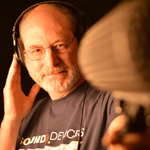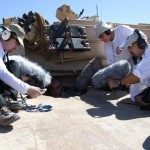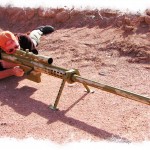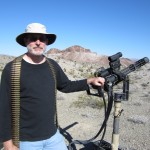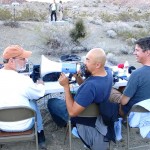Brief list of credits:
Author of the book ‘The Complete Guide to Game Audio‘, lead author of the book ‘Game Audio Development’, Operation Flashpoint: Dragon Rising, The Settlers II – 10th Anniversary, Traditions Edition and Vikings Edition, Tom Clancy’s ENDWAR, Colin McRae DIRT, Red Orchestra 2 – Heroes of Stalingrad, Sonopedia 2 sound library and dozens of casino games worldwide.
Tell us a little about yourself and what you do for a living?
Well, for those who don’t know me and if you really have to put a ‘label’ on me, I guess I’d say… I’m a composer, sound designer, field recordist, voice over artist, author, teacher, game audio advocate, business owner, husband, father, farmer, motorcycle and exotic car enthusiast, handyman, janitor, landscaper and probably, all-around busy guy. Between my audio career, family and the menagerie of animals (currently 6 dogs, 2 cats, horse, goats and chickens), there’s plenty of excitement and always something going on!
As for how I make my living, I’ve been creating music, sound effects and field recordings for the video and casino gaming industries for over 20 years. I’ve been teaching Field Recording and Game Audio courses at The Art Institute of California – San Diego for several years and I’m also the author of the book “The Complete Guide to Game Audio” and lead author of “Game Audio Development”, part of Jeannie Novak’s Game Development Essential series. While I mainly focus on audio for games, I’ve also done TV and film projects, audio production, live sound, sound libraries, military simulators, consulting and even audio forensics. It’s a big world out there and lots of audio waiting to be managed! The secret to a long and happy career is definitely multiple income streams!
Can you give us a brief summary of the equipment you use regularly?
Of course, it depends on what I’m doing at the time. When I’m composing, I’m usually manning my Alesis QS8 keyboard (as my controller) and triggering samples through Kontakt running through Sonar. I’ve got a multitude of instruments and other controllers close by as the need arises – acoustic, electric and bass guitars (including the versatile Line 6 modelling guitar), a Roland electronic drum kit, a box of percussion instruments and other noise making devices.
If I’m doing sound design, I’m usually working in Vegas Video and Sound Forge, layering elements from personal or licensed sound libraries on my Windows-based PC.
For field recording, I use whatever gets the job done. I’ve got a Fostex FR2 and Rode NTG3’s ready to go at a moment’s notice to capture those ‘sounds of opportunity’. I also have a Tascam DR680, Edirol R44, Zoom H4 and H2 in the stable depending on the circumstance. But, for those big vehicle or weapon recording sessions, we pull out all of the stops with the Sound Devices recorders, preamps and a large variety of microphones.
What are your go-to plug-ins and software? (virtual instruments, audio processing etc.)
As far as ‘go to’ software, Sound Forge is my main power tool. Whether I start there or end there, every audio file I create goes through that software at some point. I’ve used SF since my early days and it’s such a seamless part of my process that I don’t even have to think about it. I seem to be using Cakewalk Sonar a lot these days. The audio quality is superb, and while it can be a bit clunky to use, I’m finding it does most of what I need when composing. I run Kontakt through Sonar as my main virtual instrument. I’ve got nearly a terabyte of instrument samples and Kontakt holds up really well. For my sound design work, I still really enjoy how easy Vegas Video is to use. I don’t like software getting in the way of my creative process and find this program is very powerful and incredibly simple to use. Beyond that, I tend to gravitate towards whatever gets the job done at the time – but these seem to be my favorites.
You are the author of “The Complete Guide to Game Audio” book. Can you briefly tell us how the project started and how was the writing process?
One of my life’s goals had always been to write a book and have it published. The funny thing is, I always thought it was going to be a novel! Life certainly moves in mysterious ways and when I saw an opportunity, you better believe I jumped in with both feet!
A couple of years into my game audio career, I had started writing for Gamasutra and Game Developer Magazine, partly to share some things that I’d learned and also as a way to market myself. After a few articles, a publisher took notice and approached me with the idea of writing a book on the subject. It didn’t take long before I was in San Francisco signing a contract and the rest, they say, is history. About a week later, the shock of what I’d agreed to do hit home and that’s the moment I realized what I’d gotten myself into. I’ve never written a book before! Aaaaahh!! What have I done?! I started with a solid outline, made a plan to write at least 1 page a day and somehow, after a year of having my head buried in my laptop, a book appeared. Yeah, it was a fairly daunting task and it certainly required a lot of dedication but the result was a project that I’m very proud to have completed.
The second edition of the book came out in 2008. We have heard rumours that you are now in the process of writing the 3rd edition of the book? What can the readers expect from the new edition?
Yep – it’s true. I just signed the contract for the 3rd edition and am madly organizing my ideas as we speak!
Obviously, this edition will be updated to the current state of the game audio business, creative techniques and all of the new technologies. The Xbox One, PlayStation 4, Wii U, Android and iOS platforms will be added as well as sections on middleware and scripting tools like FMOD and Wwise. I’m also planning on adding as much information on voice overs and field recording for games that I can squeeze in – something I was thinking about the last time but didn’t get the chance to do. I’ll be introducing new composers and sound designers in the popular interview sections and I’m sure I’ll be including a new story or two from my latest experiences in the trenches. I promise, it’ll be a good read and hopefully continue the legacy of the first 2 editions! Reserve yours today! Lol!!
When do you find you are most creative and are there any particular secrets to your creativity?
Ha! I love this question! I’d like to say that I’ve got a battle-tested, never fail formula for my creativity but sadly, I’m pretty much like everybody else who creates audio professionally. In the early days, I found I was most creative late at night when everything was quiet. But I eventually discovered that mindset was too limiting for the ‘work for hire’ scenario and not an efficient use of time. So, I learned the ‘faucet’ approach and can turn the creative machine on and off at will, making any time my most creative time! Now, that’s not to say that I don’t get truly inspired when I work but to make it in this or any creative business, you have to be able to produce timely, quality work – without making excuses!
What is your usual process for creating audio content for games?
Usual process? What’s that? That’s why I love this industry so much – every day is an adventure!
Anyone who’s knows me will tell you that I’m pretty much in constant motion. And not to sound like some ‘time management’ oddball or anything, I believe that taking charge of the finite amount of time you have in a day will make you productive, keep you sane and allow for important things like family, friends and recreation. So, with that in mind, I try to plan my days, work from a checklist, give myself a deadline to finish those tasks – get in the studio, get the work done and then get out. Don’t get me wrong. I absolutely love creating audio of all sorts but I’ve discovered that having a balance between all of the important things will actually keep you loving your work, keep you happy and keep those who share your life happy as well.
As for ‘usual’, I do have some things that I do regularly when creating audio content. When I’m composing, the first thing I like to do is work out an approach and decide on my tools. I like to define which instruments and samples I will be using before I even start writing and once everything is in place, I create templates and set up the studio appropriately. Once I’m in the ‘zone’, I like to just be able to write and record without having to stop to find an instrument or get pulled out of the moment. I keep the momentum going until I’ve either run out of the time I allotted earlier or when I feel the music is complete. Once I reach this point, I like to walk away from it overnight and give it a fresh listen the next day. If my reaction isn’t “What the heck was I thinking?”, then I polish it up and send it on its way.
My approach to sound design is essentially the same. I like to gather elements which I think will fit into the project and theme first, whether that is sifting through sound libraries or grabbing the field recording gear and heading out. Once I’ve got a full palette of sounds, I’ll start work on the needed sounds. In general, I like to get all of the ‘administrative’ stuff done and out of the way so I can concentrate on the ‘creative’ stuff. I think it’s the left brain/right brain battle with me – I hate flopping from side to side and would rather focus on each task so I can get it right the first time and move on to the next one quickly and efficiently. Then again, I could just be full of crap! Lol!
You have a strong musical background. How often do you find yourself blending that into your sound design work?
The short answer – always!
I’m not sure if it’s a blessing or a curse at this point but I’m always listening to how the audio elements are working together as well as how the sounds work with any music that might be playing. I like to create sounds that harmonize with the rest of the game soundscape and pay close attention to any tones or pitch the sound elements may have. If it’s something prevalent, such as a force field, a tractor beam, a laser or an engine sound, for example, I’ll purposely tune it referencing the key of the music or other sound effects. If it’s supposed to be a ‘good’ sound or something that one of the ‘good guys’ makes, I’ll tune it to the key I’ve chosen for the game. If it’s a ‘bad’ sound or a sound from a ‘bad guy’ I might make that sound out of tune with the intent of making it stand out or uncomfortable.
My musical background also tends to work on another level when I’m doing sound design. I’ve noticed over the years that I treat sound effects like very small pieces of music. They start, they play, they end and no matter how simple the sound, I like it to go somewhere with it – even if it’s only on a short journey. There are so many similarities between music composition and sound design that I think it’s hard not to let one influence the other. For the most part, I use the same multi-track software, layer, pan, mix, apply effects processing, bounce and edit the same way. And since I was composing and engineering long before I learned sound design, you could say the music has quite an effect on how I work today.
You seem to be always on some kind of a field recording trip. Any major do’s and don’ts when it comes to field recording?
Yeah, I make it a point to get out of the studio every once in a while, that’s for sure. Thanks in part to my business partner, Watson Wu, we get involved with some interesting projects which always take us on an adventure of some sort. We’ve had the pleasure of pointing microphones at a variety of subjects over the years – military tanks and vehicles, weapons of every size, animals, exotic cars – all great experiences and I can happily say, all successful experiences!
As for “do’s”, the best advice I can give is to be prepared for any contingency no matter what you may have planned for. There is a high percentage of unpredictably when you’re out in the field and personally, there is absolutely NO way I’m going to make the effort to be somewhere and not get anything accomplished. Most of the time, everyone on the team will make it a point to bring all of their recording gear, mics, cables, batteries and whatever else that might be useful. Yeah, we may have planned to do it one way but putting all of your eggs in the proverbial basket is just asking for trouble.
I was working as part of Watson’s team on a major weapons shoot. We had a great location and the weather was perfect for the first 4 days of the shoot. On the final day, we were literally pulling out the big guns and were really excited about our subjects for the day. We had on hand a mini gun with thousands of rounds and a customized 20mm rifle – it was the end of an already awesome week and we were looking forward to the finale with these babies! The nature of these weapons required us to change location from the previous days, which normally wouldn’t have been an issue except the wind had picked up considerably. 30 knots with strong gusts had our mic stands blowing over, gear scattering everywhere and worst of all, our windscreens were ineffective. Yeah, you could say panic started to creep in about now but despite feeling tired from a long week, we were still up for the challenge.
We maneuvered our vehicles to block the worst of the wind, built bunkers for the clusters of microphones from whatever we could scrounge and grabbed our usually unused omni-directional mics from the bottom of the bag. We had to dig deep into our bag of tricks that day. I have to say it was probably the most extreme we’ve ever had to get to record anything but we weren’t about to let these weapons get away! Thankfully we were prepared and salvaged what could have been a disaster for our clients.
As far as “don’ts”, I’d say the top of my list is not to lose your patience! Recording outside of a controlled studio environment can be one of the most challenging, unpredictable and crazy endeavours you can imagine. Not only are you managing your recording subject while attempting to capture the highest quality sound possible, but you’re fighting the weather conditions, animals, bugs, aircraft and all of the other noise making things, typically insignificant but with a hot mic is suddenly substantial. You’ve got a paying client to impress or you’ve travelled hours to get somewhere and don’t want the trip to be a grand waste of time or you’ve funded expensive equipment for your own library – there are plenty of things which can pile on the pressure. The secret is to set yourself up for success. Plan the session in detail, prepare and test your gear before you leave, pack plenty of batteries, cables, microphones and recorders and be ready to exercise your patience especially when things don’t look like they’re going to go your way. Things WILL go wrong, that’s a given. Just be ready for it and your odds for success will increase exponentially!
Any specific “lessons learned” on a project that you could share?
As part of the same session I mentioned earlier – all of us had flown in from all points of the continent and it was a major logistical effort just to be there. A large team, nearly a hundred weapons, a truckload of ammunition, a very remote site and a tight schedule really put the pressure on. We had a solid plan, a motivated team, a good weather forecast and all of our gear… or so we thought.
Setting up the first day took a dramatic turn when we realized the crate of XLR cables were still sitting back at the hotel. After our heart rates returned to a more manageable level, we contemplated solutions. The drive to the hotel and back would take about 3 hours and because we had gotten to the site late morning, that idea would pretty much sink the day so that thought was dismissed in the first 30 seconds. Luckily my ‘be prepared’ Boy Scout upbringing had already saved the day. I had packed up my entire supply of cables and they were sitting just a few yards away in my bags. With this sudden revelation, we regrouped, designed a new microphone layout and salvaged what could have been a disastrous day, both to us and our client who never caught on that we had come so close. Whew! It was a major lesson for all of us and as a result, we plan for as much redundancy as possible on every session!
If you could only give two tips to an aspiring sound designer what would those be?
Me…give just two?!? Ha! Well, let me see if I can’t give you the short answer…
First of all, I’d say that no matter how good you might be as a composer or sound designer, your enthusiasm will be the most important aspect of your personality you can reveal. Unless you are a well-known talent and have a resume a mile long, there is going to have to be something about you that potential clients will take immediate notice of. Enthusiasm is one of those things that is infectious and people just want to be around it! Having a passion for what you do will get the rest of the creative team excited and it can ultimately be the deciding factor of whether you get the job or not. I had a client in the early years tell me “You aren’t the best sound designer we’ve interviewed but you are definitely the most enthusiastic – and that’s why we hired you!” Use it the next time you’re out looking for work and be sure to tell me how it went.
As for a second tip, because working in the games industry can lead to serious technological overload if you’re not careful, I’d say stay as informed about the latest audio tools, implementation techniques and available technologies as you can. Now, that’s not to say that you have to spend 100% of your time researching and learning things you might never use, but know that it exists and be able to find the information you need if and when the time comes. Make it part of your morning routine – grab some coffee and peruse game development websites, game audio forums and any game related news no more than 30 minutes a day. If you run across something of interest, follow the leads and be a little curious about it. Bookmark any links that might prove a good future resource and move on with your day. At some point, you’ll need to learn more about a specific subject and already have the resources available. I don’t advocate that you learn how to do audio for Xbox, PlayStation and Wii or be an expert at FMOD and Wwise, for example, and never have a project using any of this knowledge. If it was me, I would become an expert at my given craft first and learn these other highly involved skills as I need them. The resources are there and I don’t know a game audio person who wouldn’t be happy to share what they’ve learned along the way or at least point you in the right direction!
What are your plans for the future?
My hope is to continue doing audio work for many years to come! But, whether I keep doing it as an independent contractor or on an in-house team is the real question. I love working when and if I want but recently, I’ve been considering a change of pace – perhaps a new location or concentrating on the creative stuff in-house. I’ve been testing the waters lately, applying at a few places and seeing if there might be someplace I can find a home and contribute my brand of talent and skills. Of course, working in San Diego is tough to beat but my family and I are ready for an adventure! I can’t wait to see where the next chapter takes us!
Any tips, hints or motivational speeches for the readers?
I’ve always got plenty of advice to share, of course….what would you like to hear?
I think the most important aspect of what we do as creative people is ability to actually make a living doing it. It seems I have the same conversation almost weekly with my students. These guys truly love every aspect of audio production, from the music to sound design to voice over’s to field recording – so much so, they’d do it for free if you let them! I really can’t blame them either since I was in the same shoes once. Having the privilege to create some really great audio for a project feels like the ultimate reward but that feeling won’t put a roof over your head or food on the table. So, here’s what I tell them.
Your time and talents are worth something – don’t ever undervalue or give them away for free! Game developers and publishers intend to make money with their product and as a contributor, you should be paid for your efforts when putting together a marketable product for them. Unfortunately, music and sound effects still, after all of these years, seem to have little value and some development folks don’t understand what it takes to create quality audio. As an audio content creator, you may have paid for an education or have devoted time in your ‘experience’. You’ve probably spent some money on professional equipment, software, samples, sound libraries, instruments and studio space. All of these investments probably came at significant expense so, don’t you think that it’s rational that you earn a fair amount in return for this huge investment? Of course you do!
Thanks to Pasi Pitkänen and the crew at The Audio Spotlight for the opportunity to talk with you today! This website is a great resource and it is a privilege to be included!

